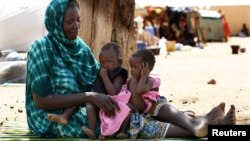GENEVA —
The U.N. refugee agency (UNHCR) says thousands of Malians have become internally displaced or are seeking refuge in neighboring countries as clashes escalate between French troops and Islamist rebels.
Officials say the humanitarian situation in the central Mopti region in particular is deteriorating as a consequence of recent fighting.
The U.N. Office for the Coordination of Humanitarian Affairs (OCHA) estimates that more than 30,000 people have fled their homes since the French military intervention on Friday, bringing the number of displaced in Mali to around 230,000.
OCHA spokesman Jens Laerke says the increasing number of internally displaced will only exacerbate already tenuous health, shelter, sanitation and food-security resources in the north.
“This renewed fighting, particularly in central and northern Mali, comes at a time when an estimated 4.2 million Malians will need humanitarian help," he said. "This includes ... hundreds of thousands of malnourished children.”
The U.N. estimates there are some two million food-insecure people in Mali. Last year, the World Food Program managed to reach 1.2 million beneficiaries in the country, more than one-quarter of a million of whom were in the Islamist-rebel-controlled north.
WFP says it is monitoring the situation closely, but that growing insecurity is severely limiting access to northern areas. The agency also says it stands ready to respond to increased needs in case of further population movements.
In the meantime, UNHCR reports over 1,200 Malian refugees have crossed into neighboring Niger, Burkina Faso and Mauritania in recent days, where, according to UNHCR spokesman Adrian Edwards, the agency is already providing clean water, sanitation, healthcare and education to tens of thousands who have already fled the violence.
“We are in all these countries seeking to relocate refugees away from the border to safe areas," he said, explaining that the work is ongoing. "In Niger are conducting what we call 'level 2' refugee registration, which is more detailed individual refugee registration, which allows us to get a better sense of the population size. We will be continuing to revise our figures for the refugee populations as data reliability improves.”
The UNHCR reports the total number of Malian refugees in the region is 144,500 and that its humanitarian operation is running a $44 million shortfall.
The U.N. Children’s Fund says there is a high risk of children becoming separated from their families during flight, warning that unaccompanied children are much more vulnerable to many forms of abuse, including recruitment for combat and sexual violence.
Officials say the humanitarian situation in the central Mopti region in particular is deteriorating as a consequence of recent fighting.
The U.N. Office for the Coordination of Humanitarian Affairs (OCHA) estimates that more than 30,000 people have fled their homes since the French military intervention on Friday, bringing the number of displaced in Mali to around 230,000.
OCHA spokesman Jens Laerke says the increasing number of internally displaced will only exacerbate already tenuous health, shelter, sanitation and food-security resources in the north.
“This renewed fighting, particularly in central and northern Mali, comes at a time when an estimated 4.2 million Malians will need humanitarian help," he said. "This includes ... hundreds of thousands of malnourished children.”
The U.N. estimates there are some two million food-insecure people in Mali. Last year, the World Food Program managed to reach 1.2 million beneficiaries in the country, more than one-quarter of a million of whom were in the Islamist-rebel-controlled north.
WFP says it is monitoring the situation closely, but that growing insecurity is severely limiting access to northern areas. The agency also says it stands ready to respond to increased needs in case of further population movements.
In the meantime, UNHCR reports over 1,200 Malian refugees have crossed into neighboring Niger, Burkina Faso and Mauritania in recent days, where, according to UNHCR spokesman Adrian Edwards, the agency is already providing clean water, sanitation, healthcare and education to tens of thousands who have already fled the violence.
“We are in all these countries seeking to relocate refugees away from the border to safe areas," he said, explaining that the work is ongoing. "In Niger are conducting what we call 'level 2' refugee registration, which is more detailed individual refugee registration, which allows us to get a better sense of the population size. We will be continuing to revise our figures for the refugee populations as data reliability improves.”
The UNHCR reports the total number of Malian refugees in the region is 144,500 and that its humanitarian operation is running a $44 million shortfall.
The U.N. Children’s Fund says there is a high risk of children becoming separated from their families during flight, warning that unaccompanied children are much more vulnerable to many forms of abuse, including recruitment for combat and sexual violence.




